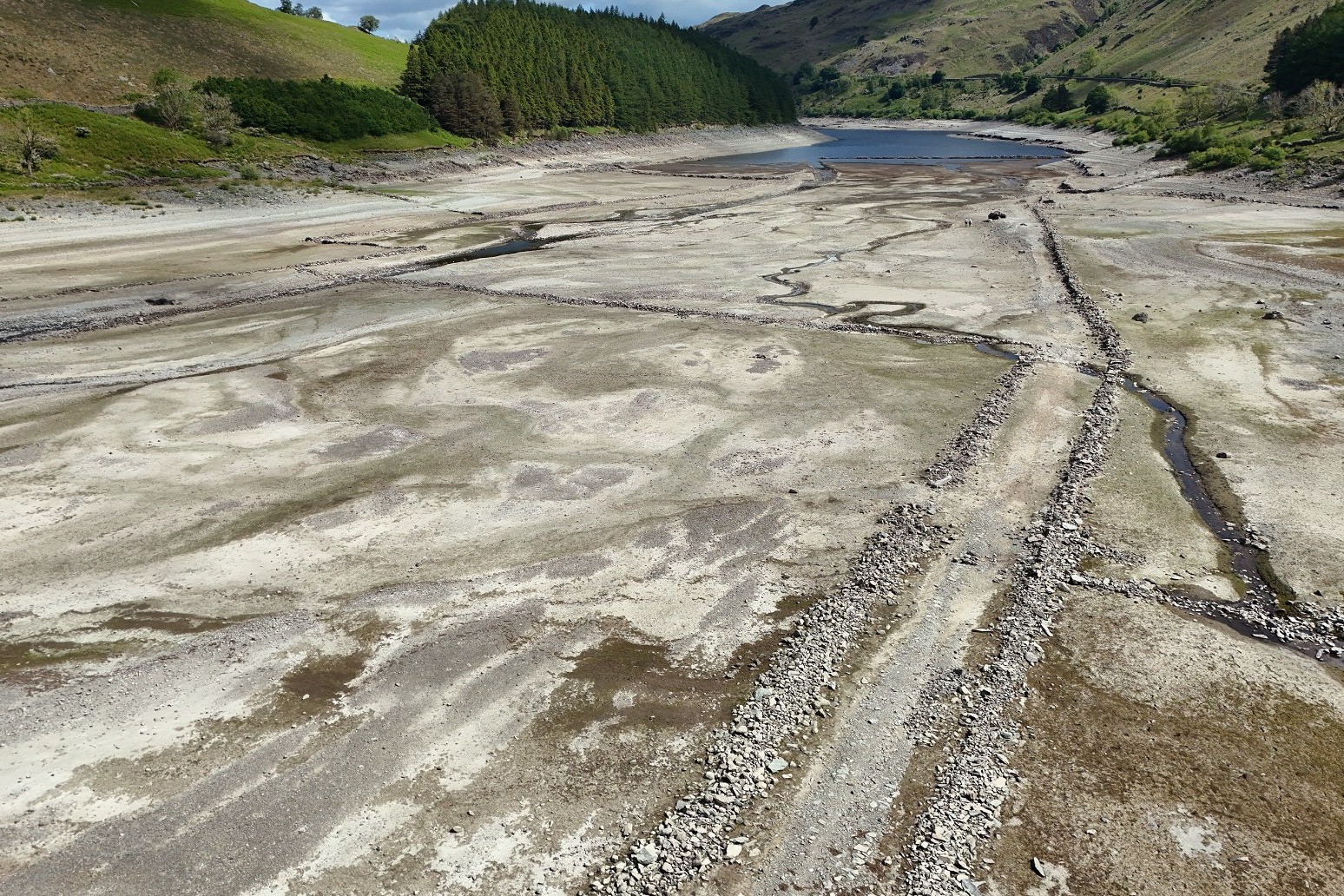Listeners:
Top listeners:
-
 play_arrow
play_arrow
Rother Radio (128K) Love Local, Love Music!
-
 play_arrow
play_arrow
Rother Radio (64K) Love Local, Love Music!
-
 play_arrow
play_arrow
Rother Radio (South Yorkshire) (64K) Love Local, Love Music!
-
 play_arrow
play_arrow
Rother Radio (South Yorkshire) (128K) Love Local, Love Music!
-
 play_arrow
play_arrow
Rother Radio (Doncaster) (64K) Love Local, Love Music!
-
 play_arrow
play_arrow
Rother Radio (Doncaster) (128K) Love Local, Love Music!
-
 play_arrow
play_arrow
Rother Radio Xmas Love Local, Love Music!
-
 play_arrow
play_arrow
Rother Radio – Special Announcement Love Local, Love Music!
Water shortfall in England now ‘nationally significant’, drought officials warn
today12/08/2025


England is now suffering from “nationally significant” water shortfalls despite rain in July, officials warned as the country faces more hot, dry conditions.
The national drought group, which includes the Met Office, regulators, government, water companies and other organisations, has met as five areas of the country remain in drought, with six more in prolonged dry weather status.
England is seeing widespread environmental and agricultural impacts from the lack of water, which is hitting crop yields, reducing feed for livestock, damaging wetlands and river wildlife, and increasing wildfires, the group said.
Experts warn climate change is driving more extreme weather conditions in the UK, worsening drought and dry spells, and making heatwaves more frequent and severe.
Despite unsettled weather in July with many places seeing heavy rain or showers, it was still the fifth warmest on record.
Many river flows and reservoir levels continued to recede compared to June – and are now well below where they should be for the time of year.
Dry weather has returned in August, with the fourth heatwave of the summer set to see temperatures climb into the 30s once more – putting extra pressure on overstretched water supplies.
Reservoir levels fell 2% last week and are now 67.7% full on average across England, compared to the 80.5% normally seen for the first week of August and down on the 75.6% average last month, the Environment Agency said.
The lowest reservoirs are Blithfield, Staffordshire, Derwent Valley group of reservoirs in Derbyshire, and Chew Valley Lake and Blagdon Lake in Somerset, all of which are less than half full.
Nearly half of England’s rivers (49%) had below normal, notable or exceptionally low flows in July, with two – the Wye and Ely Ouse – at their lowest on record.
There are currently navigation closures or restrictions across sections of the Leeds and Liverpool, Macclesfield, Trent and Mersey, Peak Forest, Rochdale, Oxford and Grand Union Canal.
Despite wet conditions for many in July, rainfall was 89% of the long-term average for the month across England, making it the sixth consecutive month of below-average rainfall, the Environment Agency (EA) said.
Figures from the EA also show central England has had the driest February to July since 1921.
There appears to be no or little let-up in the dry conditions for some areas in the coming days, according to the Met Office.
Dr Will Lang, chief meteorologist at the Met Office, said: “This week is starting off warmer than of late across England and Wales, with temperatures getting towards the mid-30s Celsius for some in the south.
“While conditions remain mostly settled across the south, the picture is more unsettled further north-west, with rain or showers at times.
“As we move into the second half of August there are indications of high pressure building and therefore largely settled conditions overall.
“Although dry weather is more likely, rain, showers or thunderstorms cannot be ruled out.”
Officials have praised the public for following hosepipe bans, which are in place for all Yorkshire Water customers, and parts of the regions served by Thames Water, South East Water and Southern Water.
People are being urged to take simple actions such as turning off taps and deleting old emails – which reduces demand for water to cool data centres – to help reduce the impact on the environment.
Yorkshire Water has reported a 10% reduction in domestic demand following their hosepipe ban – a saving of up to 80 million litres a day or 32 Olympic-sized swimming pools.
The EA’s director of water and national drought group chairwoman Helen Wakeham said: “The current situation is nationally significant and we are calling on everyone to play their part and help reduce the pressure on our water environment.
“Water companies must continue to quickly fix leaks and lead the way in saving water.
“We know the challenges farmers are facing and will continue to work with them, other land users and businesses to ensure everyone acts sustainably.
“We are grateful to the public for following the restrictions, where in place, to conserve water in these dry conditions.
“Simple, everyday choices – such as turning off a tap or deleting old emails – also really helps the collective effort to reduce demand and help preserve the health of our rivers and wildlife.”
National Farmers’ Union vice-president Rachel Hallos said farmers and growers continued to face extremely dry conditions.
“Some farms are reporting significant drop in yields which is financially devastating for the farm business and could have impacts for the UK’s overall harvest,” she said.
“Farming is a long-term industry and there is growing concern about the months ahead.
“Minimal grass growth means many livestock farmers are already tapping into winter feed stocks, raising the risk of higher production costs later in the year.”
She called for investment in water infrastructure and a more effective planning system.
Experts warn periods of dry weather and low rivers – some of which are used to provide drinking water for people in the regions through which they flow – reduce oxygen levels in water that can lead to fish kills, algal blooms and prevent wildlife moving up and down the river.
Drying out wetlands hits species that rely on the habitat while an increase of wildfires are hitting heathland and moorland.
A major incident declared at a wildfire at Holt Heath, Dorset – along with the blaze on Arthur’s Seat, Edinburgh – prompted the Fire Brigades Union (FBU) to issue a warning that fire services do not have the resources to keep the public safe.
With rising temperatures this week, fire and rescue services are likely to face an increase in incidents, but funding cuts have left them without enough crews and resources, the FBU said, pointing to the Holt Heath fire which drew in firefighters from five neighbouring services.
FBU general secretary Steve Wright said wildfires were “intensive and dangerous incidents” which required large numbers of firefighters and specialist equipment.
“These incidents are on the rise as a result of the climate emergency and, as the last 24 hours have shown, they are happening in areas across the UK,” he said, warning budget cuts meant services did not have the resources to cope.
He added: “To protect the public, the Government must provide the investment needed to address this crisis and rebuild resilience.”
Published: by Radio NewsHub
Written by: Radio News Hub
Similar posts
Now Playing
Now playing: -
On Air Now

Paul Harvey
The Afternoon Show
Join Paul for the best variety of hits through your workday afternoon.
closeSponsored
Weather
Upcoming Local Event
Latest from Facebook
Search Rother Radio
Contact Us
- https://www.rotherradio.co.uk
- 01709 257 175
- studio@rotherradio.co.uk
About Us
Rother Radio – Love Local, Love Music! → Discover more
Our Partners
Rother Radio is owned by Rotherham Broadcasting CIC






